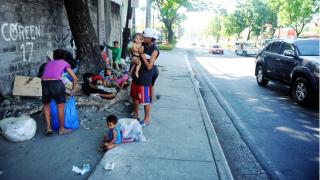This is the 11th case study from SUEUAA (Strengthening Urban Engagement in Universities in Asia and Africa), written by Rebecca Marquez of St Scholastica's College, Manila, Philippines. SUEUAA is interested in how Universities in the Global South can contribute to solving geographical, economic, and social issues in their cities.
Manila, the capital of the Philippines, is also a home to street dwellers. More than 190,000 are street dwellers living in pushcarts and makeshift homes, scavenging through garbage for their daily subsistence. They are informal settlers living in the streets with no regular income and no permanent residence. The children play in streets, scavenge through the trash, denied formal education.
The Tuluyan San Benito (Welcome House of St. Benedict), a programme of the Missionary Benedictine Sisters who run St. Scholastica’s College is a case study on urban engagement.
Aside from providing a temporary shelter where street families can drop in to wash their clothes, clean themselves and cook their food, Tuluyan San Benito provides self-help livelihood initiatives for economic upliftment. Street dwellers are taught simple financial management systems on small scale business ventures such as selling candies, cheese sticks and banana fritters which are sold in the streets. Pedicabs or tricyle cabs are provided through loan arrangement with easy repayment schemes. These programmes aim to provide a more stable and safe source of income for the street dwellers, moving away from scavenging.
The lack of education of the street children is also addressed through the regular weekly mobile library that goes around the communities of the street families during the day time. Mothers help arrange tables and chairs when the mobile library arrives. Volunteers read books with the children as well teach reading. Referrals of street children are made to public schools which provide free education. At the same time, minimal allowances are solicited for transportation expenses of the street children. The older children are referred to vocational schools who are later recommended for employment after course completion.
To further engage and develop the skills of the street children, the faculty and students of the School of Music started the programme “From Street to Strings” which aims to develop the musical potential of some street children. These children are taught to play the violin. From January 2019, at least six children from the street families have been regularly attending violin classes. In a few months, they will be joining a concert of the School of Music.
TheTuluyan center also coordinates with the barangays or the village centers, especially in providing identification documents for the street families. Being registered in a particular Barangay, allows street families to avail themselves of some social services provided by the government including health care. They are also provided with identification cards which allow them to participate as citizens of the communities and country such as voting in elections.
Aside from this, the community engagement of St. Scholastica’s College is also focused on women's empowerment. Through training on consciousness-raising especially on women’s rights and issues, women are slowly learning to break gender stereotypes and define themselves as women and as partners in society.
Gender sensitivity training for men has recently been organized realizing that the improvement of gender relations and dynamics entails not just women, but the participation of men as well.
To further increase awareness and discussion of women's and gender issues, women are encouraged to write their expressions and studies which were published by the Institute. Deeper discussion on these issues were tackled in three previous radio programs as well as a weekly television program.

